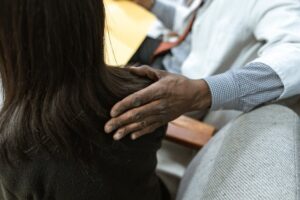Signs of PTSD & How You Can Begin To Heal
Post-traumatic stress disorder (PTSD) is a mental health condition that can affect individuals who have experienced or witnessed a traumatic event. It can have a profound impact on a person’s life, affecting their daily functioning, relationships, and overall well-being. Recognizing the signs of PTSD is crucial for seeking timely help and beginning the healing process.
Signs of PTSD
Flashbacks and Intrusive Memories
Individuals with PTSD may experience vivid flashbacks or intrusive memories of the traumatic event. These can be distressing and make it challenging to concentrate on daily tasks.
Nightmares
 Persistent nightmares related to the traumatic event are a common symptom of PTSD. These dreams can be so intense that they interfere with sleep, leading to fatigue and irritability during waking hours.
Persistent nightmares related to the traumatic event are a common symptom of PTSD. These dreams can be so intense that they interfere with sleep, leading to fatigue and irritability during waking hours.
Avoidance
People with PTSD will often avoid anything that reminds them of the traumatic event. This could include avoiding specific places, people, or activities that trigger distressing memories.
Hyperarousal
Individuals may become easily startled, irritable, or have difficulty sleeping. They may be on edge, constantly on the lookout for potential threats, even in non-threatening situations.
Negative Changes in Mood and Thinking
PTSD can lead to negative changes in mood and thinking. This may manifest as persistent guilt or shame, diminished interest in previously enjoyable activities, or a pervasive sense of detachment from others.
Difficulty Concentrating
Concentration and memory issues are common in individuals with PTSD. This can impact work or academic performance and exacerbate frustration and helplessness.
Emotional Numbing
Some individuals with PTSD may experience emotional numbness, making it difficult for them to connect with others on an emotional level. This emotional detachment can strain relationships and contribute to feelings of isolation.
How to Begin the Healing Process
Seek Professional Help
The first step in healing from PTSD is seeking professional assistance. A mental health professional, such as a therapist or counselor, can provide a safe space to discuss experiences and emotions and develop coping strategies.
Educate Yourself
Understanding PTSD and its effects is crucial for both individuals with the condition and their loved ones. Education fosters empathy and reduces stigma, creating a more supportive environment for healing.
Establish a Support System
 Building a strong support system is essential for recovery. Friends, family, and support groups can offer understanding, encouragement, and companionship, helping to alleviate feelings of isolation.
Building a strong support system is essential for recovery. Friends, family, and support groups can offer understanding, encouragement, and companionship, helping to alleviate feelings of isolation.
Practice Self-Care
Engage in self-care activities that promote relaxation and well-being. This may include regular exercise, mindfulness practices, adequate sleep, and hobbies that bring joy and fulfillment.
Follow a Routine
Establishing a routine can provide a sense of stability and predictability. This can be especially helpful for individuals dealing with the unpredictability of PTSD symptoms.
Gradual Exposure
Working with a mental health professional, individuals can gradually expose themselves to triggers in a controlled and supportive environment through Accelerated Resolution Therapy (ART). This helps reduce the emotional intensity associated with traumatic memories over time.
Mind-Body Techniques
Incorporating mind-body techniques such as meditation, deep breathing, or yoga can help manage stress and improve overall well-being. These practices can contribute to a sense of calm and balance.
Medication Management
In some cases, medication may be prescribed to alleviate specific symptoms of PTSD. It’s important to work closely with a healthcare provider to determine the most appropriate treatment plan.
Healing from PTSD is a unique and individual journey. It requires patience, self-compassion, and a commitment to the recovery process. By recognizing the signs of PTSD and taking proactive steps toward healing, individuals can regain control over their lives and build a foundation for a healthier future.
If you or someone you know is struggling with PTSD, reach out to learn more about trauma therapy. Remember, healing is possible, and you are not alone in this journey.

